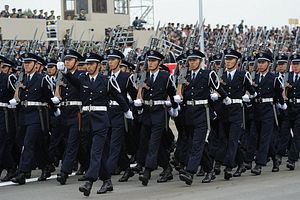Prime Minister Shinzo Abe and his government passed their security bills on September 20, despite strong opposition and anxiety expressed by the public. The United States should welcome the changes, this is an important step forward for Japan as Washington and Tokyo further deepen their alliance relations. However, it is important for the United States to manage its expectations for Japan, as the role and missions of Japan’s Self Defense Forces (JSDF) will not be fundamentally altered, and Japan’s security policy will remain very much defense-oriented at least for the near future.
The media has portrayed Japan’s recent legislative activity as remilitarization. They are missing the point. Japan is indeed gearing for change, but it is limited in scope, and the anticipated changes are firmly rooted in the U.S.-Japan alliance. Rather than aiming to project Japan’s military power across the Asia-Pacific, the recently passed security legislation is intended to make Japan a more capable ally to the United States. In the revised Guidelines for U.S.-Japan Defense Cooperation, Japan committed itself to assisting U.S. operations without geographic constraints in response to situations that threaten Japan’s peace and security. To fulfill this commitment, Abe’s Cabinet proposed the security legislative package that was approved on September 20.
In explaining the rationale for the security bills, the ruling Liberal Democratic Party (LDP) has repeatedly emphasized that the bills are designed to “stop wars.” Consider the challenging security environment surrounding the country: the North Korean regime refuses to give up its missile and nuclear programs and the long-standing threat from North Korea shows no sign of abating; China is increasingly assertive in disputed territories in the East and the South China Seas while simultaneously growing economically and militarily; and international security threats such as terrorism and cyber attacks are growing more destructive. The security dynamic in East Asia is getting more complex and difficult to manage by the day. While Japan recognizes U.S. commitment to the alliance, Tokyo remains concerned that the United States may hesitate to involve itself in a conflict that does not directly threaten U.S. interests. Japan’s efforts to gain more security assurances by tightening its alliance with the United States on the one hand and easing some of the legal constraints on its JSDF on the other are, therefore, logical steps for Japanese policymakers to take.
Nevertheless, the security legislation is unlikely to bring about drastic change in how the Japanese government utilizes the JSDF. While the types of activities that the JSDF is now allowed to engage in have broadened, these newly authorized missions — especially the ones that are deemed as Japan exercising the right of collective self-defense — require the Diet’s prior approval. For instance, Japanese leaders have repeated emphasized that Japan’s future decisions on whether to exercise the right of collective self-defense will be extremely limited, restricted to only those situations that directly impact Japan’s own security. Even Japanese assistance to the U.S. military in a crisis on the Korean Peninsula, they argued, would most likely be limited to logistical support, and only possible with prior Diet approval and consultations with the United States or South Korea. In short, Japan needs to clear a pretty high threshold in order to actually mobilize JSDF for those new missions.
The Japanese public, which remains apprehensive of even minimal use of force, is another constraining factor. The results of a poll taken by the Yomiuri Shimbun on September 20, immediately after the security legislation passed the Diet, demonstrated that the vast majority of the public — around 80 percent — were not convinced that the legislation was necessary. You can also see a clear trend in the polls for the last six months that the approval rate for Abe has been rapidly sinking since his government submitted the security legislation to the Diet. These results reflect the deep apprehensions held by the Japanese public. Their aversion to any legal change that might possibly lead to the increased use of force will restrain the application of the security legislation in the near future.
The security legislation is an integral part of Abe’s forward-looking foreign policy strategy, making a “proactive contribution to peace.” In 2013, Abe proclaimed that “Japan will never be a tier-two country,” and his task “is to look toward the future and make Japan the ever more trusted partner for the region and the world.” Emphasizing “Japan is back,” Abe hopes that the Japanese people will gain more confidence about their country and be more outward-looking when thinking about Japan’s future. However, how the debate over the security legislation went down in the Diet raises questions about how much the new security legislation will facilitate JSDF’s more robust participation in overseas missions as a part of this strategy.
The first case that the Japanese government may bring for Diet approval based on the new legislation is an expansion of the scope of the mission for JSDF troops that take part in UN peacekeeping operation in South Sudan. How the Diet handles this anticipated request — and the public response to it — will be a good indicator of how much more the United States can expect Japan to do under the new security legislation, particularly for overseas operations that are not clearly tied to Japan’s own security.
Yuki Tatsumi is Senior Associate at the Henry L Stimson Center in Washington D.C., concurrently serving as Non-resident Senior fellow at Canon Institute for Global Studies in Tokyo. Mengjia Wan is a graduate student at Georgetown University and a former research intern at the Stimson Center.

































